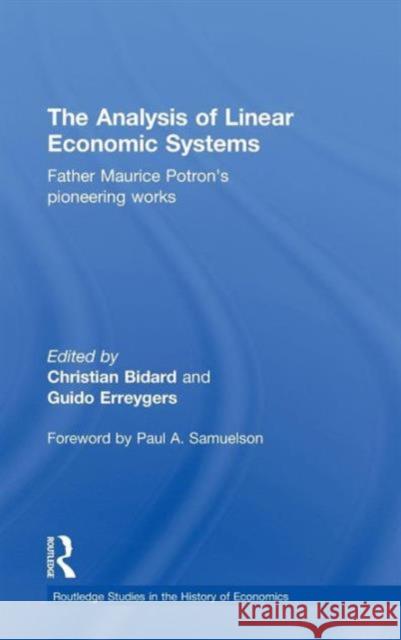The Analysis of Linear Economic Systems: Father Maurice Potron�s Pioneering Works » książka
The Analysis of Linear Economic Systems: Father Maurice Potron�s Pioneering Works
ISBN-13: 9780415473217 / Angielski / Twarda / 2010 / 268 str.
The Analysis of Linear Economic Systems: Father Maurice Potron�s Pioneering Works
ISBN-13: 9780415473217 / Angielski / Twarda / 2010 / 268 str.
(netto: 699,68 VAT: 5%)
Najniższa cena z 30 dni: 705,23
ok. 22 dni roboczych.
Darmowa dostawa!
Maurice Potron (1872-1942), a French Jesuit mathematician, constructed and analyzed a highly original, but virtually unknown economic model. This book presents translated versions of all his economic writings, preceded by a long introduction which sketches his life and environment based on extensive archival research and family documents. Potron had no education in economics and almost no contact with the economists of his time. His primary source of inspiration was the social doctrine of the Church, which had been updated at the end of the nineteenth century. Faced with the 'economic evils' of his time, he reacted by utilizing his talents as a mathematician and an engineer to invent and formalize a general disaggregated model in which production, employment, prices and wages are the main unknowns. He introduced four basic principles or normative conditions ('sufficient production', the 'right to rest', 'justice in exchange', and the 'right to live') to define satisfactory regimes of production and labour on the one hand, and of prices and wages on the other. He studied the conditions for the existence of these regimes, both on the quantity side and the value side, and he explored the way to implement them. This book makes it clear that Potron was the first author to develop a full input-output model, to use the Perron-Frobenius theorem in economics, to state a duality result, and to formulate the Hawkins-Simon condition. These are all techniques which now belong to the standard toolkit of economists. This book will be of interest to Economics postgraduate students and researchers, and will be essential reading for courses dealing with the history of mathematical economics in general, and linear production theory in particular.
Maurice Potron (1872-1942) was a French Jesuit mathematician who wrote about fifteen papers in which he presented and analysed an economic model of his own. Potron had no education in economics and almost no contact with the economists of his time. His primary source of inspiration was the Catholic doctrine: he was closely related with Catholic social organisations concerned with the ‘social question’. Faced with the ‘economic evils’ of his time, he reacted by utilizing his talents as a mathematician. He therefore invented and formalized a general disaggregated model in which production, consumption, employment, prices and wages are the main unknowns. He introduced four basic principles or normative conditions (‘sufficient production’, the ‘right to rest’, ‘justice in exchange’, and the ‘right to live’) to define both situations of ‘acceptable production and consumption’ and of ‘just prices and wages’. He studied the conditions for the existence of such solutions, both on the quantity side and the value side, and the way to implement them.
This book makes Potron's work available in the English language for the first time. For modern economists, Potron's work has many features of the utmost interest: the technology is described by a disaggregated input-output model, well before the seminal work of Leontief in the 1930s; his existence results are based on the use of the Frobenius theorem, which is quite astonishing, since the theorem had been published only two years before, and all other applications in economics are post-1945; and Potron had a clear idea of duality properties between quantities and prices and proved two duality theorems. The idea was rediscovered many years later, and is now a standard tool in economic analysis.











